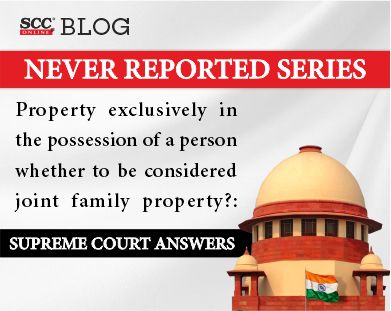Supreme Court: In a case where an appeal was filed against the decree of the trial Judge holding that the disputed property was the joint family property, the Division Bench of Mehr Chand Mahajan and Khaliluzzaman Siddiqi, JJ. held that the trial Judge adopted a wrong approach to the question in issue and the disputed property was separate property, as was correctly held by the Judicial Committee and the High Court.
Facts of the case
The plaintiff-appellant sued for possession of the lands in dispute as manager of the joint Hindu property on the allegation that these belonged to the joint Hindu family and that the defendant-respondent was in possession of them without any right whatsoever. The defendant-respondent contended that her grandfather was originally the owner of the lands in dispute, and that on his death they devolved on her mother and after her mother’s death, she got them as the next heir. The trial Judge held that the property in the suit had been proved to be the joint family property of the plaintiff- appellant and his brothers.
An appeal was filed before the High Court, and the High Court held that it was not established that the defendant-respondent’s grandfather was in possession of the property as a member of the joint Hindu family and from the course of its devolution and other evidence it was proved that the property was the separate property of the defendant-respondent’s grandfather and that it had come to the defendant-respondent in due course of inheritance. Further, an appeal was filed against the decision of the High Court before the Judicial Committee of the State and later was filed before this Court under Article 374(4) of the Constitution.
Submissions on behalf of the Appellant
Counsel for the plaintiff-appellant contended that the trial Judge was the Judge of facts and he had heard the evidence and recorded the statements of witnesses and that no sufficient grounds existed for reversing the decision of that court.
Analysis, Law, and Decision
In rejecting the plaintiff-appellant’s claim that the property was coparcenary, the High Court considered the following factors and held that the lower courts had erred in their decision:
-
The property in the suit was exclusively in possession of the defendant-respondent’s grandfather and he alone was its pattedar. His brothers were not shikmidars with him, and this was confirmed by its subsequent devolution. After the death of the defendant-respondent’s grandfather, it descended to his son, then to the defendant-respondent’s mother and then to the defendant-respondent. Therefore, the fact of the devolution of the estate in this way was incompatible with its being joint family property. Moreover, this course of devolution was not only followed in respect of the property of the defendant-respondent’s grandfather but also in the branch of one of the brothers of the defendant-respondent’s grandfather, where the property devolved in a similar way.
-
The behaviour of the plaintiff-appellant’s father when he entered into arrangements with the two widows and accepted them as the owners of the property in their possession. Under these arrangements, the widows could give part of the property to their daughter’s son, and the rest was to be taken over by the plaintiff-appellant’s father in the name of one of his sons. This, such conduct on the part of the plaintiff-appellant’s father was inconsistent with the property being joint family property.
Thus, the High Court held that the Courts below it should have held that the property in dispute was the separate property of the defendant-respondent’s grandfather or that it was not proved that it was joint family property.
The Supreme Court held that the judgment of the trial Judge was not based on a mere appreciation of the oral or documentary evidence but was also vitiated by reason of his wrong legal approach to the question in issue as he considered that it was for the defendant-respondent to allege a partition and prove it. Moreover, when the trial Judge was faced with the fact of the devolution of the property to the widows in two branches of the family, the trial Judge failed to find any satisfactory explanation of that circumstance.
The Supreme Court concluded that no sufficient grounds existed for differing from the view that the High Court’s approach to the question in dispute was correct under the circumstances of the case. Thus, the Supreme Court dismissed the appeal and held that disputed property was not joint family property, and that the judgments of Judicial Committee and High Court were correct. The Supreme Court also awarded costs.
[Kishta Reddi v. Ananthamma, 1950 SCC OnLine SC 27, decided on 29-9-1950]



